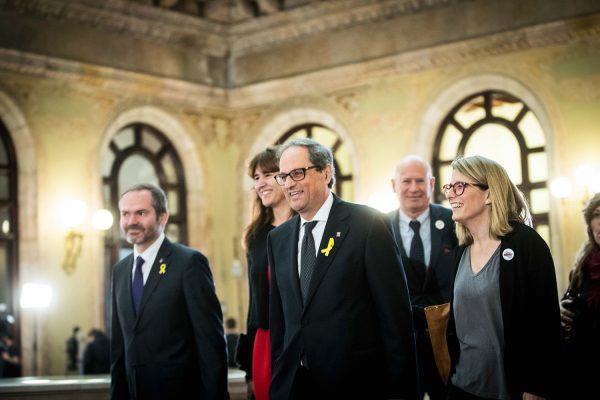
Catalan nationalists, up to and including the deposed regional president Carles Puigdemont, see the Spanish judiciary as part of a “deep state” that frustrates Catalan ambitions at every turn.
That diminishes the meaning of the term “deep state”. Spain isn’t Egypt or Turkey.
It does have judges who are more political, and more reactionary, than the rest of Western Europe. I saw the consequences after more than two million Catalans defied a Constitutional Court ban to vote in an independence referendum in 2017. (I lived in Barcelona at the time.) Politicians and protest leaders were arrested and imprisoned. Spanish courts overturned a Catalan presidential election. As recently as last week, judges ordered a Catalan lawmaker to give up his seat in the regional parliament. Spanish “lawfare” against the Catalan independence movement has entered its fifth year.
Conservative veto
When Poland’s right-wing government tries to control the appointment of judges, it sets off alarm bells in Brussels. Yet Spain has a similar system. Supermajorities in both houses of parliament are needed to elevate judges to the General Council of the Judiciary, which appoints lower-level judges. Since the Spanish Senate, like America’s, gives relatively more power to rural areas that tend to vote conservative, right-wing parties essentially have veto power over appointments to the council, and thus over the appointment of judges.
They used that power to prevent social democratic prime minister Pedro Sánchez from promoting more progressive judges. Another similarity with the United States, where Republicans prevented Barack Obama from filling a Supreme Court seat during the last year of his presidency.
Conservatives on the General Council appoint mostly conservative judges. Independent-minded Catalans bear the brunt of the consequences.
Criminalized separatism
The Supreme Court of Spain has effectively criminalized Catalan separatism by convicting not just the politicians who led a failed breakaway in 2017 under laws against “sedition” but the leaders of the region’s two largest pro-independence groups as well, who did little more than encourage Catalans to vote.
Only two of the twelve justices of the Constitutional Court (which supersedes the Supreme Court in constitutional questions) agreed the prison sentences, ranging from nine to thirteen years, were excessive. Sánchez pardoned all nine separatists last year.
Before he was convicted, but while he was held in pre-trial detention, Oriol Junqueras, the leader of Catalonia’s largest pro-independence party, was barred by the Supreme Court from attending his swearing-in ceremony as a member of the European Parliament, to which he was elected in May 2019. Spain’s electoral authorities claimed Junqueras needed to be physically present at the ceremony to be considered a European lawmaker, which would have granted him immunity from prosecution. The European Parliament itself has no such rule. The European Court of Justice ordered Spain to release Junqueras on bail so he could be inaugurated. It didn’t. One of the conditions of Junqueras’ pardon is that he does not return to politics.
When Poland’s Constitutional Tribunal ruled that its laws take precedence over the European Union’s, the European Commission was rightly furious. When Spain outright ignored the European court, almost nobody noticed.
Yellow ribbons
Spanish courts have removed several Catalan politicians from power, most notably Puigdemont’s successor as president, Quim Torra, in 2020.
Torra had the temerity to hang a yellow banner from his presidential palace in Barcelona during the Supreme Court trial to signal support for Junqueras and the other prisoners. Electoral authorities argued this violated rules on political neutrality. That was enough for the Supreme Court to overturn the Catalan presidential election and force Torra to resign.
A left-wing member of the Catalan parliament, Pau Juvillà, was forced to resign earlier this month for committing the same “offense”. Juvillà, who supports Catalan independence, was a Lleida city council member at the time of the 2019 municipal elections and refused to remove yellow ribbons — not even from the city council’s office, but from his own political party’s!
Free speech?
The National Court in Madrid (one tier down from the Supreme Court) sent Catalan and Balearic Island rappers Pablo Hasél and Valtònyc to prison (in separate cases) for “glorifying” terrorism in their lyrics and slandering the monarchy. The verdicts were upheld by the Supreme Court — and criticized by Amnesty International and the Council of Europe as attacks on free speech.
The rappers aren’t alone. Dozens of Spanish journalists, musicians and ordinary social-media users have been convicted in recent years under vaguely worded antiterrorism statutes that give Spanish judges extraordinary discretion; a discretion many have been willing to use — always to criminalize left-wing and separatist expressions.
In Barcelona, both the Pompeu Fabra University and the University of Barcelona were fined for violating the “freedom of education” and “freedom of speech” of their students by putting out statements in support of the jailed Catalan separatists. The verdicts were inevitably upheld by the Supreme Court on appeal, which apparently saw no contradiction in universities of “violating free speech” by exercising free speech.
